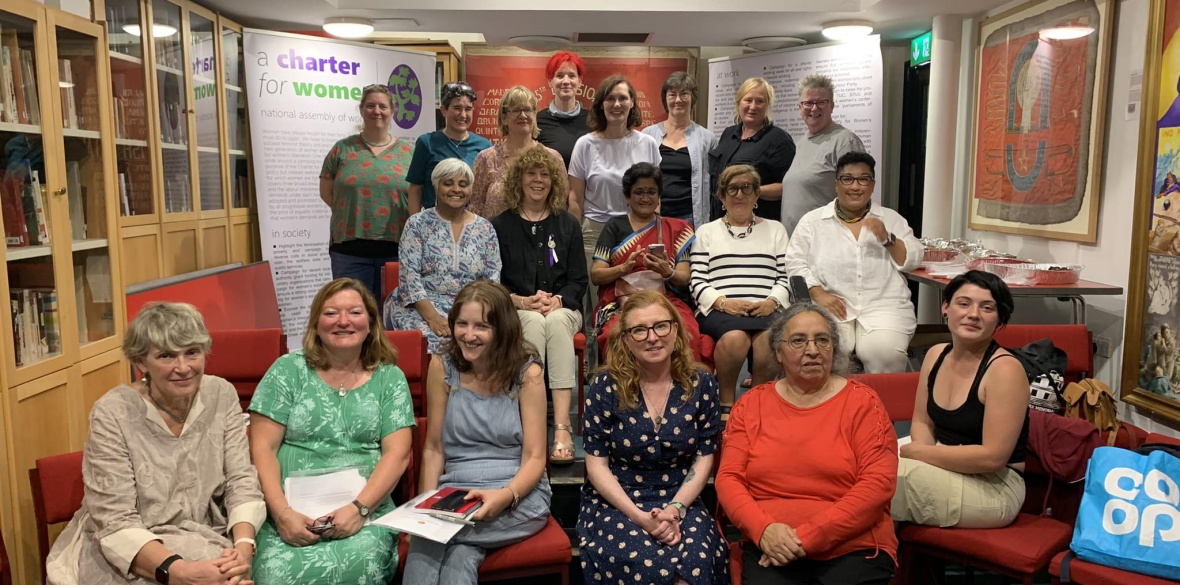This is the last article you can read this month
You can read more article this month
You can read more articles this month
Sorry your limit is up for this month
Reset on:
Please help support the Morning Star by subscribing here
SISTERS from up to 10 groups, hailing from England, Wales, Scotland and Northern Ireland, gathered at London’s Marx Memorial Library last Saturday for a Communist Party-initiated women’s liberation symposium to discuss the current pressing threat to women’s rights and the possibility for co-ordinated working.
Flanked by the library’s display of red banners of the British Battalion volunteers in the Spanish civil war — one of which sported a caption that it had been proudly stitched by the women of Barcelona — Mary Davis of the Communist Party women’s advisory panel kicked off proceedings, explaining the spark for the event was the extraordinary response the CP had to its statement earlier this year on Scotland’s Gender Recognition Reform Bill.
The statement, issued by the party’s executive committee in March, raised concerns about provisions of the Bill that made it easier for people to self-identify their gender in Scotland and how that might interact with women’s rights under wider UK equality law, which is a reserved matter.
Although the Bill was passed at Holyrood last year, it remains in limbo after being blocked by an unprecedented Section 35 order from Westminster which is now facing legal challenge.
In something of a surprise, the CP statement received over four million views on Twitter and resulted in many of messages of support and queries about what can be done next to ensure women’s rights are upheld — and so the symposium was an attempt to address just that, to “create the beginnings of a discussion,” Davis said, among groups that had some of the same concerns.
A flavour of the strength that can be achieved through movement-building was given by guest speaker Mariam Dhawale, national general secretary of the All India Women’s Democratic Association, a giant organisation working in 26 Indian states and with a membership of more than 10 million mostly poor rural and urban women.
She explained that for many years after Indian independence, while the women’s movement was large, the groups that developed were all at state level — until 1981, when delegates from 12 states held a unity conference in Chennai to create AIWDA, which in the four decades of its existence has grown and chalked up some impressive gains in a country where “from the moment of being born women have to struggle.”
Some of the victories for women include the 1994 Pre-Conception and Pre-Natal Diagnostic Techniques Act, against sex detection tests in the womb that favour boys (“although implementation still has a long way to go,” says Dhawale); anti-domestic violence laws (“women who campaigned for these were accused of wanting to break up families”); and laws against sexual assault on children and sexual harassment in the workplace — but Dhawale warned it has been an uphill struggle: “Government authorities, the police and the courts are all biased against women,” she said.
Dhawale described how AIWDA had the capacity to mobilise hundreds of thousands of women on a particular issue, rallying on the streets and even surrounding government buildings if their demands are not met.
The event then opened up into a more informal, long-table format in which women could discuss any topics they wished in a dialogue around a table on the stage, followed by breakout workshops to explore feminist questions and report back.
Themes that emerged were encouraging women to speak; overcoming fear of “saying the wrong thing;” policing of women’s language and complexities of pronoun use; the need for spaces for women to come together for collective activities and to form friendships; the importance of local struggles; maintaining democracy within feminism; and the loss of consciousness of the power of collective action.
Pragna Patel of Feminist Dissent spoke eloquently about the spread of identity politics, which “has captured both the right and the left.”
“The right has picked up identity politics to promote nationalist, anti-migrant policies — it is marching ahead with that and we as women ought to be very concerned,” she said, while “the left is seeing suppression of dissent from within and freedom of speech issues.
“We have to go back to class politics and move away from just sectional issues — not only are we not advancing on rights, we are going into retreat,” she cautioned, adding: “Human rights can be overturned overnight.”
Claire Heuchan of the women’s rights charity FiLiA paid tribute to the battles of the second wave feminists whose work she had been researching at Glasgow Women’s Library, saying we should be careful not to “create a narrative that younger women should not admire what older women achieved.”
Mary Davis highlighted a document called the Charter for Women, which had been adopted by the National Assembly of Women and a number of trade unions about 15 years ago. She suggested there could be a revived role for the charter and that the NAW “was keen to see it developed and adopted to create a focus for debate.”
“Underpinning a movement has to be a set of values, and the charter can be a starting point,” she said.
Enthused after an intense and politically thought-provoking day, sisters resolved to meet again to discuss these ideas further.
Asked for her thoughts on the symposium, Dhawale said: “From everything I’ve seen at this meeting, there is great potential for a fantastic women’s movement in the UK — so be confident!”
What happens next will be up to women themselves to decide and to build.










